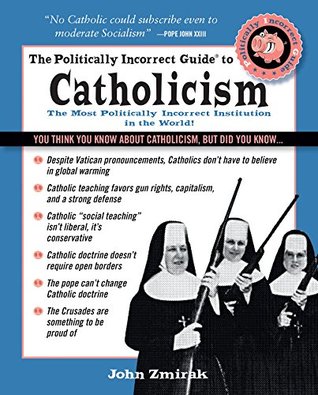In 2004, Regnery, the grandparent of conservative publishing in the United States, began a series of Politically Incorrect Guide books that are often funny, sometimes outrageous, and usually erudite. They’ve almost always been controversial, and not just because the liberal media haven’t liked them. Some conservatives have winced at what they consider to be liberties taken with facts and with authors out of their depth.
Well, treat every book after its just desert and which shall ‘scape burning? There are always villagers with torches. Maybe it doesn’t help that everyone, the publisher in the first instance, refers to the series as PIG. There’s even a cute porcine logo, winking knowingly at the reader.
Indeed, some books in the series need taking with a grain of salt, because humor is key characteristic in most – none more so than in The Politically Incorrect Guide to Catholicism by John Zmirak. Mr. Z is author of another series from another publisher under the general title of The Bad Catholic’s Guide, which includes volumes devoted to Good Living, the Seven Deadly Sins, the Catechism, and Wine, Women & Song. So Mr. Z knows whereof he jests. (Full disclosure: John has contributed to The Catholic Thing, as have a number of the people who have given blurbs for his book.)
But when it comes to the Church of Rome, if you can’t laugh, you’ll cry.
Now it must be said that Mr. Zmirak possesses an acid wit. Of Pope Francis, he writes that His Holiness has used his bully pulpit . . .
. . . tirelessly to vent his private opinion on global warming, economics, immigration, and a long list of other issues on which he is less well-informed than the average American who watches Fox News.
Okay. But a very serious point is being made here, as the very next sentence emphasizes: “None of that matters.” These are things, whatever the pope’s expertise may be, that are outside his authority. Then more acidity: “He has no more claim to anyone’s deference on these subjects than a traffic cop who stops you to offer gynecological advice.” Chapter 2 is titled “The Pope, the Other Bishops, and When and Why Catholics Have to Believe What They Say – and When and Why We Don’t.”
Any bishop who reads the book is advised to keep smelling salts at hand. I happen to agree with much of what John writes in PIG Catholicism, but I have to say that if one were thinking this might be a good book to give to somebody interested in the faith there are probably better options: not necessarily Catholicism for Dummies (although not necessarily not) and not necessarily the Catechism (too “inside baseball” for the beginner), but definitely Bishop Barron’s Catholicism.
PIG Catholicism is more for those of us in the faith who want a stimulating refresher in what we believe and why.
Then again, if that person one is hoping to evangelize is cynical but smart, Zmirak may be the best Virgil you could offer. This is because most people looking at the Church from the outside begin with slapdash objections to the papacy, Transubstantiation, the veneration of saints, the Immaculate Conception, and so on, and Zmirak is all about anticipating those objections and explaining/refuting them with disarming charm.
In the book’s tenth chapter, “Is the Church Anti-Science?” one section is called “Galileo: Self-Aggrandizing Jackass.” The great Italian scientist, Zmirak writes, had a canine taste for publicity, and wouldn’t have ended up in jail if he hadn’t, essentially, called Pope Urban VIII a blithering idiot. Catholics, he writes, “do not approve of intellectuals being imprisoned for mocking authorities.” To be sure. But then follows a digression about the persecution of Catholics in Tudor England, which concludes that British martyrs “would have gladly settled for the comfy house arrest. . .that Galileo endured.”
That sort of thing is excusable mostly because the chapter relies so heavily on citations of the work of the great scientist-priest Stanley Jaki, OSB. And Zmirak shows his erudition in the following section (“Will the Vatican Start an Infallible Weather Channel?”) by quoting a conversation from Evelyn Waugh’s Brideshead Revisited, that sends up Laudato ‘Si (misspelled in PIG Catholicism as Laudatio Si), in which a priest asks a convert if it will rain on the morrow if the pope says so:
“Oh, yes Father.”
“But supposing it doesn’t rain, what then?”
“Well. . .Uh. . .I guess it would be, ah, spiritually raining. Only. . .We were too sinful to see it!”
It becomes clear, as one reads on, that PIG Catholicism is not so much an evangelical tool as it is a weapon against the absurdities of liberal Catholicism. It’s a combat manual for warriors against heresies, soft and hard. In this it succeeds admirably.
But it’s not all war and no peace. In a Q&A self-interview, the author asks “So why choose the Catholic Church?” His answer:
Because it has the original claim to be the Church Christ founded, continuity with Him, a powerfully convincing intellectual account of what the Gospels mean and what they don’t, and a record of faithfully passing along apostolic beliefs – however unattractive to the culture that surrounds it. Also it has produced by far the best body of art, literature, architecture, and music. I’m not sure beauty will save the world, but it makes the place much more livable.
Yes it does, and even if this book might have more accurately titled The Politically Incorrect Guide to Post-Vatican II Catholicism, it remains an invaluable compendium explaining why the leaky Barque of Peter will never founder.















